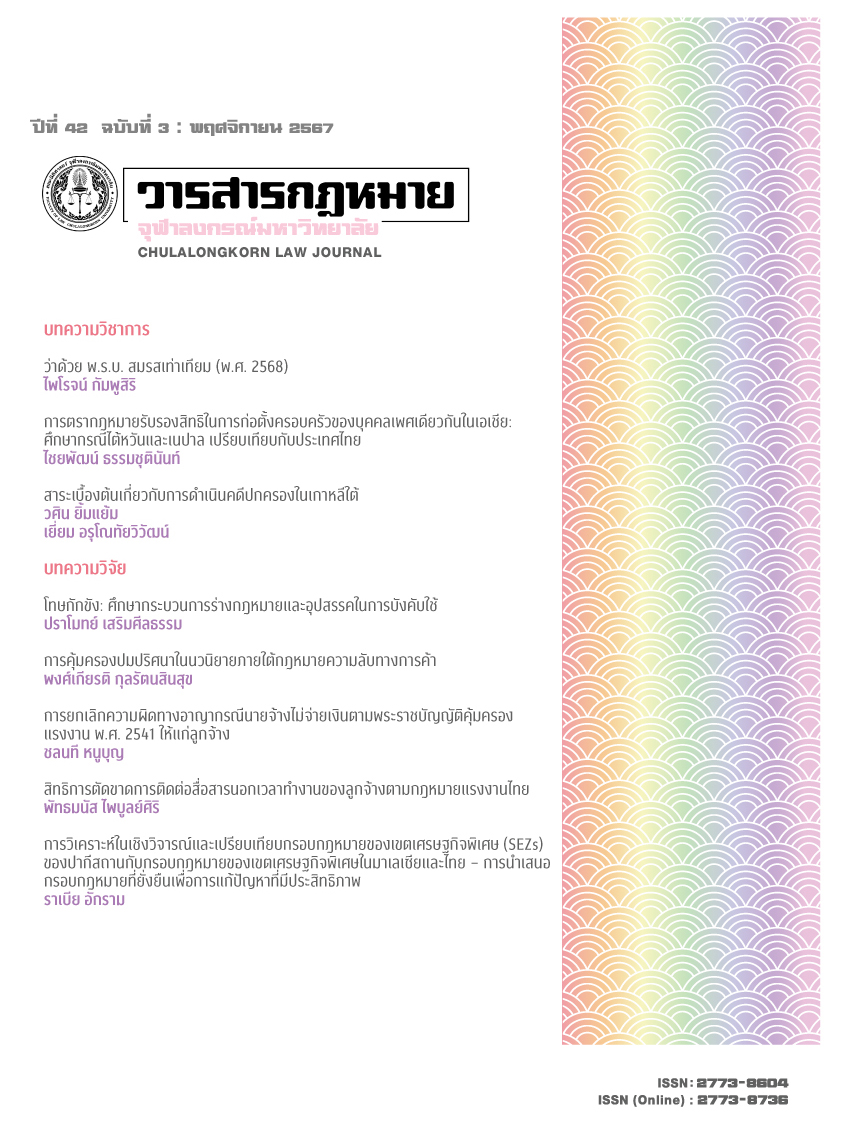การยกเลิกความผิดทางอาญากรณีนายจ้างไม่จ่ายเงินตามพระราชบัญญัติคุ้มครองแรงงาน พ.ศ. 2541 ให้แก่ลูกจ้าง
Main Article Content
บทคัดย่อ
สัญญาจ้างแรงงาน โดยหลักแล้วเป็นสัญญาซึ่งอยู่บนพื้นฐานสัญญาทางแพ่ง ถูกบัญญัติไว้ในประมวลกฎหมายแพ่งและพาณิชย์ บรรพ 3 เอกเทศสัญญา ลักษณะ 6 จ้างแรงงาน ตั้งแต่มาตรา 575 ถึงมาตรา 586 โดยมีวัตถุประสงค์แห่งสัญญาจะเป็นกรณีลูกจ้างตกลงทำงานให้นายจ้าง และนายจ้างก็ตกลงจ่ายสินจ้าง หรือค่าจ้างให้แก่ลูกจ้างตลอดเวลาที่ทำงานให้ ซึ่งนอกจากค่าจ้างแล้ว นายจ้างก็อาจต้องจ่ายค่าล่วงเวลา ค่าทำงานในวันหยุด ค่าล่วงเวลาในวันหยุด และเงินที่นายจ้างมีหน้าที่ต้องจ่ายตามพระราชบัญญัติคุ้มครองแรงงาน พ.ศ. 2541 ให้แก่ลูกจ้างให้ถูกต้องและตามกำหนดเวลาด้วย โดยเงินดังกล่าวในบทความนี้จะขอเรียกว่า “ค่าตอบแทนในการทำงาน” เนื่องจากเป็น “เงินที่ลูกจ้างได้รับเพื่อตอบแทนจากการทำงานทั้งสิ้น” ซึ่งหากนายจ้างไม่จ่ายค่าตอบแทนในการทำงานให้ถูกต้องและเป็นไปตามกำหนดเวลา ก็เท่ากับว่านายจ้างกระทำผิดสัญญา อย่างไรก็ตาม การผิดสัญญาจ้างแรงงานในกรณีไม่จ่ายค่าตอบแทนในการทำงานให้ถูกต้องหรือไม่จ่ายตามกำหนดระยะเวลา แม้ว่าจะเป็นความผิดทางแพ่ง แต่ตามพระราชบัญญัติคุ้มครองแรงงาน พ.ศ. 2541 กลับกำหนดให้ความผิดดังกล่าวเป็นความผิดอาญา ซึ่งต้องระวางโทษจำคุกไม่เกินหกเดือน หรือปรับไม่เกินหนึ่งแสนบาท หรือทั้งจำทั้งปรับ อย่างไรก็ดี กรณีดังกล่าวลูกจ้างส่วนใหญ่มิได้ประสงค์จะให้มีการดำเนินคดีอาญากับนายจ้าง เพียงแต่ประสงค์จะเรียกร้องค่าจ้างตามสิทธิพึงได้เท่านั้น ซึ่งหากมีการลงโทษอาญานายจ้างแล้วลูกจ้างก็ยังคงต้องดำเนินการเรียกร้องผ่านกระบวนการต่าง ๆ อยู่เช่นเดิม ได้แก่ การฟ้องคดีต่อศาลแรงงานหรือยื่นคำร้องต่อพนักงานตรวจแรงงาน ซึ่งมิได้มีส่วนใดเกี่ยวข้องกับกระบวนการทางอาญาเลย นอกจากนี้ ความผิดดังกล่าวยังไม่อยู่บนพื้นฐานการกำหนดโทษหรือวัตถุประสงค์การลงโทษในทางอาญา ยิ่งไปกว่านั้น ยังอาจจะขัดกับหลักการในรัฐธรรมนูญแห่งราชอาณาจักรไทย พ.ศ. 2560 อีกด้วย เป็นผลให้เกิดกฎหมายอาญาเฟ้อ และก่อให้เกิดผลกระทบตามมาอย่างมากมาย ดังนั้น บทความนี้ จึงมีวัตถุประสงค์เพื่อยกเลิกความผิดและโทษทางอาญาในความผิดฐานไม่จ่ายค่าตอบแทนในการทำงานให้ถูกต้องหรือไม่จ่ายตามกำหนดระยะเวลาและแสวงหาแนวทางอื่นในการจัดการกับความผิดดังกล่าวแทน เช่น การปรับเป็นพินัย เป็นต้น
Article Details

อนุญาตภายใต้เงื่อนไข Creative Commons Attribution-NonCommercial-NoDerivatives 4.0 International License.
ลิขสิทธิ์และเนื้อหาในเว็บไซต์ของวารสารกฎหมาย (รวมถึง โดยไม่จำกัดเฉพาะ เนื้อหา รหัสคอมพิวเตอร์ งานศิลป์ ภาพถ่าย รูปภาพ ดนตรีกรรม โสตทัศนวัสดุ) เป็นกรรมสิทธิ์ของวารสารกฎหมาย และผู้ได้รับการโอนสิทธิทุกราย
1. วารสารกฎหมาย ให้อนุญาตให้คุณใช้สิทธิอันไม่เฉพาะเจาะจงที่สามารถถูกถอนเมื่อใดก็ได้ โดยไม่มีค่าใช้จ่าย ในการ
- เยี่ยมชมเว็บไซต์และเอกสารในเว็บไซต์นี้ จากคอมพิวเตอร์หรือเครื่องมือสื่อสารผ่านเว็บบราวเซอร์
- คัดลอกและจัดเก็บเว็บไซต์และเอกสารในเว็บไซต์นี้บนลงคอมพิวเตอร์ของคุณผ่านระบบความจำ cache
- สั่งพิมพ์เอกสารจากเว็บไซต์นี้สำหรับการใช้ส่วนตัวของคุณ
- ผลงานที่ได้รับการตีพิมพ์โดยวารสารกฎหมาย จุฬาลงกรณ์มหาวิทยาลัย ถูกคุ้มครองภายใต้ Creative Commons Attribution 4.0 International License ซึ่งอนุญาตให้ทุกคนสามารถคัดลอก แจกจ่าย ดัดแปลง ส่งต่อ ผลงานได้ ก็ต่อเมื่อผลงานและแหล่งข้อมูลได้รับการอ้างอิงอย่างเหมาะสม
2. วารสารกฎหมาย จุฬาลงกรณ์มหาวิทยาลัย สงวนสิทธิ์ไม่อนุญาตให้คุณใช้สิทธิอื่นใดที่เกี่ยวข้องกับเว็บไซต์และเอกสารบนเว็บไซต์นี้ เช่น การคัดลอก ดัดแปลง เปลี่ยนแปลง ส่งต่อ ตีพิมพ์ แจกจ่าย เผยแพร่ จัดแสดงในที่สาธารณะ ไม่ว่าจะในรูปแบบใดก็ตาม ซึ่งเว็บไซต์หรือเอกสารบนเว็บไซต์ โดยไม่อ้างอิงถึงแหล่งข้อมูลหรือโดยไม่ได้รับอนุญาตเป็นลายลักษณ์อักษรจากวารสารกฎหมาย จุฬาลงกรณ์มหาวิทยาลัย
3. คุณอาจขออนุญาตที่จะใช้เอกสารอันมีลิขสิทธิ์บนเว็บไซต์นี้โดยการเขียนอีเมลล์มายัง journal@law.chula.ac.th
4. วารสารกฎหมาย จุฬาลงกรณ์มหาวิทยาลัย เข้มงวดกับการคุ้มครองลิขสิทธิ์อย่างมาก หากวารสารกฎหมาย จุฬาลงกรณ์มหาวิทยาลัยพบว่าคุณได้ใช้เอกสารอันมีลิขสิทธิ์บนเว็บไซต์นี้โดยไม่ถูกต้องตามการอนุญาตให้ใช้สิทธิ ดังที่กล่าวไปข้างต้น วารสารกฎหมาย จุฬาลงกรณ์มหาวิทยาลัยอาจดำเนินคดีตามกฎหมายต่อคุณได้ เพื่อเรียกร้องค่าเสียหายที่เป็นตัวเงินและคำขอชั่วคราวให้คุณหยุดการใช้เอกสารดังกล่าว ทั้งนี้ คุณอาจถูกสั่งให้ชดใช้ค่าใช้จ่ายใดๆ ที่เกี่ยวข้องกับการดำเนินการตามกฎหมายนี้
หากคุณพบเห็นการใช้เอกสารอันมีลิขสิทธิ์ของวารสารกฎหมาย จุฬาลงกรณ์มหาวิทยาลัย ที่ขัดหรืออาจขัดต่อการอนุญาตให้ใช้สิทธิดังที่ได้กล่าวไปข้างต้น โดยเชื่อว่าได้ละเมิดลิขสิทธิ์ของคุณหรือของผู้อื่น สามารถร้องเรียนมาได้ที่ journal@law.chula.ac.th
เอกสารอ้างอิง
Australian Government Attorney-General’s Department, “Prohibition on imprisonment for inability to fulfil a contract,” [online] Available from : https://www.ag.gov.au/rights-and-protections/human-rights-and-anti-discrimination/human-rights-scrutiny/public-sector-guidance-sheets/prohibition-imprisonment-inability-fulfil-contract [15 January 2022]
Australian Securities and Investments Commission, “Fines and penalties,” [online] Available from : https://asic.gov.au/about-asic/asic-investigations-and-enforcement/fines-and-penalties/ [30 April 2023]
Australian Securities and Investments Commission, “Penalty unit values : Table 1: Penalty unit values for breaches of Australian Government laws,” [online] Available from : https://asic.gov.au/about-asic/asic-investigations-and-enforcement/fines-and-penalties/ [28 May 2023]
Business Insolvency Helpline, “Wages not paid on time UK : What can I do if I am unable to pay my employees on time?,” [online] Available from : https://business-insolvency-helpline.co.uk/wages-not-paid-on-time/ [23 July 2022]
Casetext, “Cal. Lab. Code § 216: Section 216 - Additional penalties,” [online] Available from : https://casetext.com/statute/california-codes/california-labor-code/division-2-employment-regulation-and-supervision/part-1-compensation/chapter-1-payment-of-wages/article-1-general-occupations/section-216-additional-penalties [2 May 2023]
Douglas Husak, การกำหนดความผิดทางอาญาเกินความจำเป็น : ขอบเขตของกฎหมายอาญา (Overcriminalization : The Limits of the Criminal Law), แปลโดย สำนักกิจการในพระดำริ พระเจ้าหลานเธอ พระองค์เจ้าพัชรกิติยาภา สำนักงานปลัดกระทรวงยุติธรรม กระทรวงยุติธรรม (กรุงเทพมหานคร: กระทรวงยุติธรรม, 2560)
Federal Ministry of Justice, “German Civil Code,” [online] Available from : https://www.gesetze-im-internet.de/englisch_bgb/ [30 January 2022]
Federal Register of Legislation, “Fair Work Act 2009,” [online] Available from : https://www.legislation.gov.au/C2009A00028/2021-09-11/text [30 April 2023]
GORG YOUR BUSINESS LAW FIRM, “€ 40 Penalty for Late Payment of Wages and Salaries by Employers,” [online] Available from : https://www.goerg.de/en/insights/publications/21-03-2017/eu-40-penalty-for-late-payment-of-wages-and-salaries-by-employers [30 January 2022]
HALL PAYNE LAWYERS, “Underpayment of wages : What are the penalties for breaching the award and/or an employment contract?,” [online] Available from : https://www.hallpayne.com.au/blog/2020/march/wages-underpayment/ [30 April 2023]
International Labour Organization, “C095 - Protection of Wages Convention, 1949 (No. 95),” [online] Available from : https://www.ilo.org/dyn/normlex/en/f?p=NORMLEXPUB:12100:0::NO::P12100_INSTRUMENT_ID:312240 [23 December 2021]
Legislation.gov.uk, “Employment Rights Act 1996,” [online] Available from : https://www.legislation.gov.uk/ukpga/1996/18/section/27 [20 July 2022]
Office of the Law Revision Counsel, “The Fair Labor Standards Act,” [online] Available from : https://uscode.house.gov/view.xhtml?path=/prelim@title29/chapter8&edition=prelim [15 July 2022]
SHOUSE LABOR LAW GROUP, “California Pay Dates – How Frequently Must Wages Be Paid?,” [online] Available from : https://www.shouselaw.com/ca/labor/pay-periods/#4.1 [2 May 2023]
WORK LAWYERS SERVING CALIFORNIA, “The Law on Late & Unpaid Wage in California,” [online] Available from : https://www.worklawyers.com/late-unpaid-wages-california-law/ [2 May 2023]
WORK LAWYERS SERVING CALIFORNIA, “The Law on Late & Unpaid Wage in California : Chapter 7 Private Attorneys General Act (PAGA) Claims,” [online] Available from : https://www.worklawyers.com/late-unpaid-wages-california-law/ [2 May 2023]
กรมสวัสดิการและคุ้มครองแรงงาน กระทรวงแรงงาน (ข้อมูลจากระบบรายงานผลการปฏิบัติงาน (Web Application) ของกรมสวัสดิการและคุ้มครองแรงงาน ข้อมูล ณ วันที่ 16 มกราคม 2564)
ปราโมทย์ เสริมศีลธรรม, หลักเกณฑ์ในการกำหนดโทษทางอาญา ภายใต้โครงการสนับสนุนสารสนเทศเพื่อการทำงานของสมาชิกรัฐสภา, (กรุงเทพมหานคร: สถาบันพระปกเกล้า, 2564)
มาตรา 124 พระราชบัญญัติคุ้มครองแรงงาน พุทธศักราช 2541
มาตรา 144 พระราชบัญญัติคุ้มครองแรงงาน พุทธศักราช 2541
มาตรา 2 พระราชบัญญัติว่าด้วยการปรับเป็นพินัย พุทธศักราช 2565
มาตรา 32 พระราชบัญญัติแรงงาน พุทธศักราช 2499
มาตรา 39 พระราชบัญญัติว่าด้วยการปรับเป็นพินัย พุทธศักราช 2565
มาตรา 5 พระราชบัญญัติว่าด้วยการปรับเป็นพินัย พุทธศักราช 2565
มาตรา 575 ประมวลกฎหมายแพ่งและพาณิชย์
มาตรา 70 พระราชบัญญัติคุ้มครองแรงงาน พุทธศักราช 2541
รายงานการประชุมสภาผู้แทนราษฎร ชุดที่ 1 ครั้งที่ 16 สมัยประชุมสามัญ (วันที่ 13 กันยายน 2499)
สำนักงานคณะกรรมการกฤษฎีกา, แนวความคิดและทฤษฎีเกี่ยวกับกฎหมายอาญา, (เอกสารประกอบการสัมมนาเรื่องหลักเกณฑ์การกำหนดโทษทางอาญาในการตรากฎหมาย ณ โรงแรม เดอะเบอร์เคลีย์ ประตูน้ำ, 13 กันยายน 2560)
หยุด แสงอุทัย, “พระราชบัญญัติแรงงาน พ.ศ. 2499”, รัฐสภาสาร, 5, 13 (มีนาคม 2500): 9.


